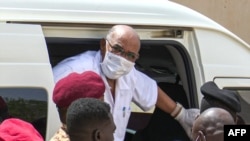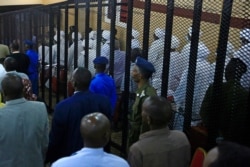The trial of former Sudanese president Omar al-Bashir and 28 co-defendants, which began Tuesday in Khartoum, has been eagerly awaited by military officers who opposed the 1989 coup that brought Bashir to power.
Ahmed al-Tayeb, a former army major who was ousted from the military and was periodically arrested by the Bashir regime, became a leader of the protests that helped drive Bashir from power.
Al-Tayeb said via WhatsApp message that the trial fulfills one of the main demands for justice that the protesters have wanted for years, but if there's no punishment, coups could happen again.
The longtime former president, who was ousted by the military in April 2019, is facing charges of undermining the constitution and violating the Armed Forces Act in the 1989 coup.
Bashir's lawyers say that the trials are political and have no legal ground.
Zain al-Abeen Mohamed, one of the former president's attorneys, said no one was tried in the past for military coups, and the trials for the May 1985 coup were political.
After taking power in 1989, Bashir issued a presidential pardon for those who took part in the 1985 coup.
Sudan's transitional authorities have pledged to hand over Bashir and some of his aides to the International Criminal Court to face charges of war crimes and genocide. The charges are related to the conflict in Sudan's Darfur region, which left an estimated 300,000 people dead and displaced millions from their homes.
The surrender last month of a Darfur militia leader who Bashir supported has raised hope that Bashir could also be put on trial at the ICC.
This trial helps further that hope, according to political analyst Alfatih Mahmound.
He said the trial in Khartoum is paving the way for Bashir's trial on war crimes charges, either at the Hague or at a hybrid court.
Meanwhile, Sudan's joint civilian-military transitional government is trying to implement reforms in the judiciary, and has launched peace talks with rebel groups that the Bashir government fought for years.
Sudan hopes to soon be removed from the U.S. State Department's list of countries that sponsor terrorism. Removal from the list would help the economy by allowing Sudan to receive foreign aid and investment.





